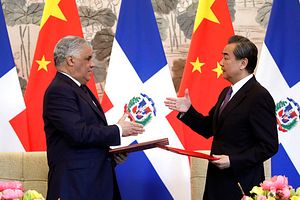In May this year, two countries – the Dominican Republic on May 1 and Burkina Faso on May 24 – announced that they would be breaking off diplomatic relations with the Republic of China (Taiwan) and restoring ties with the People’s Republic of China (China). That leaves just 18 countries maintaining diplomatic relations with Taiwan. A total of four countries have ended their diplomatic ties with Taiwan since the Tsai Ing-wen administration was inaugurated in May 2016.
China’s artifice alone is not sufficient to explain why countries are ending their diplomatic relations with Taiwan. For African countries, one major factor is that their neighbors are receiving generous helpings of economic aid from China. That creates domestic pressure for them to establish diplomatic relations with China so that they too can benefit from the economic largesse. In addition, countries can find themselves isolated because of their ties with Taiwan. Not surprisingly, many of the 18 countries that have diplomatic relations with Taiwan appear to be hoping to normalize ties with China.
China is largely free to pick and choose the point at which it normalizes diplomatic relations with these countries. Under the previous Ma Ying-jeou administration, China did not act until shortly before the end of Ma’s time in office. Beijing then stepped up the pace of diplomatic normalization once Tsai Ing-wen came to power in Taiwan. Sao Tome and Principe cut ties with Taiwan in 2016, Panama followed suit in June 2017 and then the Dominican Republic and Burkina Faso did the same in May 2018. The Kingdom of Eswatini (formerly the Kingdom of Swaziland) is now the sole African country to retain diplomatic links with Taiwan – and China is already deepening its relations with the Eswatinian royal family. For Beijing, May was a good time to have the Dominican Republic and Burkina Faso make the break, enabling it to exert pressure on Taiwan on the second anniversary of Tsai Ing-wen’s inauguration and potentially influence local elections to be held in Taiwan this year.
On entering its second term in 2017, the Chinese administration of Xi Jinping appeared to change its policy towards Taiwan. Previously, the Xi administration had favored dialogue and coordination with the Taiwanese government or the Kuomintang party. But Xi now appears to have dropped this approach. Meanwhile, China is encouraging countries to sever diplomatic relations with Taiwan and urging airlines to express Taiwan as part of China. At the same time, China has presented Taiwan with “31 measures” in an effort to encourage young people and businesspeople without direction to come to “attractive” China. These are strong jolts. The current population of Taiwan is just 23 million, yet 2 million live on the Chinese mainland. One wonders how many Taiwanese will move to Mainland China in the coming years.
For Beijing though, the extent to which it should leave Taiwan diplomatically isolated is debatable. As is often pointed out, for example, if no countries recognize Taiwan as the government of China, it will deprive Taiwan of its raison d’être, and that could in fact encourage it to declare independence. This fuels the argument for China to allow a certain number of countries to maintain diplomatic relations with Taiwan. Whether China bows to this argument or whether it plans to finish the job and leave Taiwan without diplomatic relations will be something to watch going forward.
Shina Kawashima is a professor at the University of Tokyo.

































